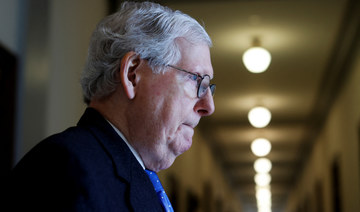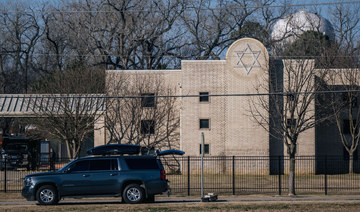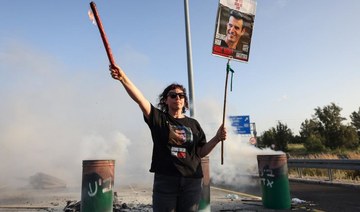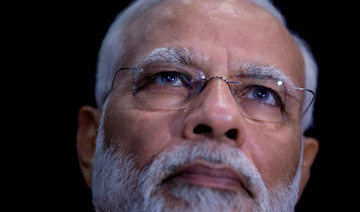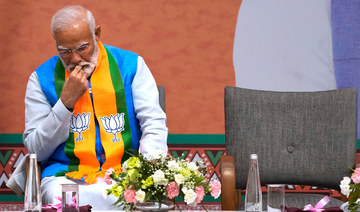WASHINGTON: From the inaugural platform, President Joe Biden saw American sickness on two fronts — a disease of the national spirit and the one from the rampaging coronavirus — and he saw hope, because leaders always must see that.
“End this uncivil war,” he implored Americans on Jan. 20, 2021. Of the pathogen, he said: “We can overcome this deadly virus.”
Neither malady has abated.
For Biden, it’s been a year of lofty ambitions grounded by the unrelenting pandemic, a tough hand in Congress, a harrowing end to a foreign war and rising fears for the future of democracy itself. Biden did score a public-works achievement for the ages. But America’s cracks go deeper than pavement.
In this midterm election year, Biden confronts seething divisions and a Republican Party that propagates the delusion that the 2020 election, validated as fair many times over, was stolen from Donald Trump. That central, mass lie of a rigged vote has become a pretext in state after state for changing election rules and fueling even further disunity and grievance.
In the dispiriting close of Biden’s first year, roadblocks stood in the way of all big things pending.
The Supreme Court blocked his vaccinate-or-test mandate for most large employers. Monthly payments to families that had slashed child poverty ran out Friday, with no assurance they will be renewed. Biden’s historic initiative to shore up the social safety net wallowed in Congress. And people under 40 have never seen inflation like this.
After his lacerating speech in Atlanta invoking the darkest days of segregation, he saw his voting-rights legislation run aground when Democratic Sen. Krysten Sinema of Arizona announced her opposition to changing Senate rules to allow the bill to pass by a simple majority.
Altering the rules would only “worsen the underlying disease of division infecting our country,” she said.
For all of that, Barack Obama was on to something when he paid his old vice president an odd compliment late in the 2020 campaign. Elect Joe Biden, he said, and after four years of flamboyant Trump dramas, folks could feel safe ignoring their president and vice president for a spell.
“You’re not going to have to think about them every single day,” Obama said. “It just won’t be so exhausting. You’ll be able to go about your lives.”
Indeed America saw normalcy, some say dignity, return to the White House. Pets came back and so did daily press briefings for the public.
The Trump-era political muzzle came off public-health authorities, freeing them to confuse the public all on their own.
First lady Jill Biden’s studded “Love” jacket at a global summit not-so-subtly countered the “I Really Don’t Care, Do U?” jacket her predecessor wore in a visit to a migrant child detention center.
The discipline, drive and baseline competence from the new White House produced notable results. Biden won a bipartisan infrastructure package that had eluded his two predecessors, coming away with a legacy-shaping fix for the rickety pillars of industry and society.
Biden steered more judges through Congress to the federal bench than any recent predecessor. He won approval of a Cabinet that was half women and a minority of white people for the first time. More than 6 million people are back at work and half a billion COVID-19 vaccines have been put in arms, but the nation has a long way to go to return to its pre-pandemic state.
“I think it’s a lot of achievements, a lot of accomplishment, in the face of some very serious obstacles,” Biden’s chief of staff, Ron Klain, told The Associated Press on the cusp of Biden’s second year. “The Biden presidency remains a work in progress.”
Matthew Delmont, a civil rights historian at Dartmouth, expected more from Biden by virtue of his decades of experience as a savvy operator in the capital.
He had anticipated a far more effective COVID-19 response and more urgency, sooner, in countering the rollback of voting rights and tilting of election rules that Republicans are attempting.
“There’s something to be said for the professionalism of the White House and not going from one fire to the next,” Delmont said. “What I worry is that the Washington he understands isn’t the Washington we have anymore.”
Political science professor Cal Jillson at Southern Methodist University in Dallas said Biden has displayed “warning track power” — the ability in baseball to hit long but not, as yet, over the fence.
In Biden, Jillson sees a leader who brought the even keel that Obama had talked about but also one who only rarely delivers a speech worth remembering.
“While there are vast partisan differences in how Biden is seen, in general he is seen as stable but not forceful,” he said.
In large measure, Biden’s innate civility and predictability brought the sort of climate change that the world could get behind.
Here once more was a president who believed deeply in alliances and vowed to repair an American reputation frayed by the provocateur in office before him.
There would be no more puzzling feelers about buying Greenland. No more doting looks at Russian President Vladimir Putin — instead, Biden stepped up diplomatic confrontation over Putin’s designs on Ukraine. There would be no eerie uplit gatherings around glowing orbs with rulers of dissent-crushing Arab countries like Trump’s photo op with the Saudis.
But the world also witnessed Biden’s debacle in Afghanistan, a chaotic withdrawal that brought more than 124,000 to safety but stranded thousands of desperate Afghans who had been loyal to the US and hundreds of US citizens and green-card holders.
Discounting warnings from military and diplomatic advisers, Biden misjudged the Taliban’s tenacity and the staying power of Afghan security forces that had seen crucial US military support vanish. He then blamed Afghans for all that went wrong. Millions of Afghans face the threat of famine in the first winter following the Taliban takeover.
All presidents enter the world’s most powerful office buoyed by their victory only to confront its limitations in time. For Biden, that happened sooner than for most. A polarized public, Trump’s impeachment trial and an evenly divided Senate saw to that.
Meantime, day after day, event after event, it was the virus that commanded Biden’s attention. “That challenge casts a shadow over everything we do,” Klain said. “I think we’ve made historic progress there but it’s still a challenge.”
After Biden’s first year, the virus and disunity rage on
https://arab.news/pu6x4
After Biden’s first year, the virus and disunity rage on

- The Trump-era political muzzle came off public-health authorities, freeing them to confuse the public all on their own
US campus protests wane after crackdowns, Biden rebuke
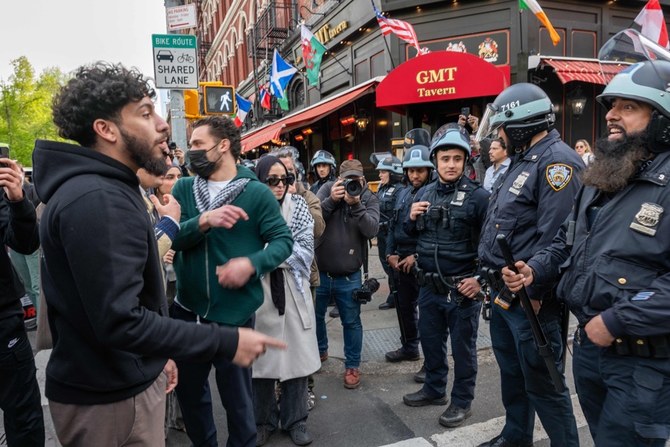
NEW YORK: Pro-Palestinian protests that have rocked US campuses for weeks were more muted Friday after a series of clashes with police, mass arrests and a stern White House directive to restore order.
Police in Manhattan cleared an encampment at New York University after sunrise, with video posted to social media by an official showing protesters exiting their tents and dispersing when ordered to do so.
The scene appeared relatively calm compared to crackdowns at other campuses around the country — and some worldwide — where protests over Israel’s war against Hamas in Gaza have multiplied in recent weeks.
University administrators, who have tried to balance the right to protest and complaints of violence and hate speech, have increasingly called on police to clear out the demonstrators ahead of year-end exams and graduation ceremonies.
At the University of Chicago, law enforcement appeared set to dismantle an encampment Friday after the school’s president said talks with protesters on a compromise had failed.
Before the clearing operation began, dozens of American flag-wielding counter-protesters showed up and confronted the pro-Palestinian group, but police separated the two sides, local media reported.
More than 2,000 arrests have been made in the past two weeks across the United States, some during violent confrontations with police, giving rise to accusations of use of excessive force.
President Joe Biden, who has faced pressure from all political sides over the conflict in Gaza, gave his first expansive remarks on the protests Thursday, saying that “order must prevail.”
“We are not an authoritarian nation where we silence people or squash dissent,” Biden said in a brief address from the White House.
“But neither are we a lawless country. We’re a civil society, and order must prevail.”
His remarks came hours after police moved in on demonstrators at the University of California, Los Angeles, which had seen a violent confrontation when counter-protesters attacked a fortified encampment there.
A large police contingent forcibly cleared the sprawling encampment early Thursday while flashbangs were launched to disperse crowds gathered outside.
Schools officials said that more than 200 people were arrested.
On the US East coast Thursday, protesters at New Jersey’s Rutgers University agreed to take down their camp after reaching a compromise with administrators — a similar deal to one made at Brown University in Rhode Island.
Republicans have accused Biden of being soft on what they say is anti-Semitic sentiment among the protesters, while he faces opposition in his own party for his strong support for Israel’s military offensive.
“There should be no place on any campus, no place in America for anti-Semitism, or threats of violence against Jewish students,” Biden said.
Education Secretary Miguel Cardona echoed the condemnation in a letter to university leaders on Friday, pledging to investigate reports of anti-Semitism “aggressively,” CNN reported.
Meanwhile, similar student protests have popped up in countries around the world, including in Australia, France, Mexico and Canada.
In Paris, police moved in to clear students staging a sit-in at the Sciences Po university.
An encampment has grown at Canada’s prestigious McGill University, where administrators on Wednesday demanded it be taken down “without delay.”
However, police had yet to take action against the site as of Friday.
The Gaza war started when Hamas militants staged an unprecedented attack on Israel on October 7 that resulted in the deaths of more than 1,170 people, mostly civilians, according to an AFP tally of Israeli official figures.
Israel estimates that 128 hostages remain in Gaza. The Israeli military says 35 of them are dead.
Israel’s retaliatory offensive has killed more than 34,600 people in Gaza, mostly women and children, according to the Hamas-run territory’s health ministry.
Biden to host Jordan king next week amid Gaza talks

- Hamas accused Israeli Prime Minister Benjamin Netanyahu on Friday of trying to derail the proposed Gaza deal with his threats to launch an operation in Rafah
- Israel has killed more than 34,000 Palestinians in Gaza, mostly women and children, according to the health ministry in the Hamas-run territory
WASHINGTON: US President Joe Biden will host Jordan’s King Abdullah II next week, the White House said Friday, as negotiations continue in the Middle East for a ceasefire in Gaza.
The meeting will be “private” and will be followed by a readout, White House Press Secretary Karine Jean-Pierre told reporters, without giving a date for the encounter.
The meeting comes against the backdrop of talks for a deal to release hostages and secure a ceasefire between Israel and Hamas in Gaza after nearly seven months of war.
The talks, which come after months of efforts by mediators Egypt, Qatar and the United States to broker a new agreement between the combatants, are at a critical juncture.
The United States has urged the Palestinian militant group to accept the “extraordinarily generous” offer.
But Hamas accused Israeli Prime Minister Benjamin Netanyahu on Friday of trying to derail the proposed Gaza deal with his threats to launch an operation in Rafah.
King Abdullah II last visited the White House in February when he called for an immediate ceasefire and warned an attack on Rafah would cause a “humanitarian catastrophe.”
In April, Jordan worked alongside the United States and other allies to shoot down Iranian drones that Tehran sent toward Israel, with the kingdom keen to avoid a wider conflict.
Austin: No indication Hamas planning attack on US troops

- Israel has killed more than 34,000 Palestinians, according to Gaza’s Health Ministry
WASHINGTON: US Defense Secretary Lloyd Austin said he did not see any indication Hamas was planning any attack on US troops in Gaza but added adequate measures were being put in place for the safety of military personnel.
“I don’t discuss intelligence information at the podium. But I don’t see any indications currently that there is an active intent to do that,” Austin said during a press briefing.
“Having said that ... this is a combat zone and a number of things can happen, and a number of things will happen.”
Austin’s remarks came as the US military said it was temporarily pausing the offshore construction of a maritime pier because of weather conditions and instead would continue building it at the Israeli Port of Ashdod.
FASTFACT
The US military says it is temporarily pausing the offshore construction of a maritime pier because of weather conditions.
The maritime pier, once built, will be placed off the coast of Gaza in a bid to speed the flow of humanitarian aid into the enclave.
“Forecasted high winds and high sea swells caused unsafe conditions for soldiers working on the surface of the partially constructed pier,” the US military said in a statement.
“The partially built pier and military vessels involved in its construction have moved to the Port of Ashdod, where assembly will continue,” it added.
Earlier this week, the Pentagon said about 50 percent of the pier had been constructed.
Israel has sought to demonstrate it is not blocking aid to Gaza, especially since President Joe Biden issued a stark warning to Prime Minister Benjamin Netanyahu, saying Washington’s policy could shift if Israel fails to take steps to address civilian harm, humanitarian suffering, and the safety of aid workers.
US officials and aid groups say some progress has been made but warn it is insufficient, amid stark warnings of imminent famine among Gaza’s 2.3 million people.
The humanitarian situation in Gaza — which has been devastated by more than six months of Israeli operations against Hamas — remains dire, with a senior US administration official saying last week that the territory’s entire population of 2.2 million people is facing food insecurity.
Canada police charge three with murder of Sikh leader Nijjar

- Nijjar was a Canadian citizen campaigning for the creation of Khalistan, an independent Sikh homeland
OTTAWA: Canadian police said on Friday they had arrested and charged three Indian nationals with the murder of Sikh separatist leader Hardeep Singh Nijjar in June 2023 and said they were probing possible links to the Indian government.
Nijjar, 45, was shot dead outside a Sikh temple in Surrey, a Vancouver suburb with a large Sikh population. Canadian Prime Minister Justin Trudeau has cited evidence of Indian government involvement, prompting a diplomatic crisis with New Delhi.
Assistant Commissioner David Teboul said the matter was still under investigation and other probes were being carried out. These “include investigating connections to the government of India,” he told a televised news conference.
Nijjar was a Canadian citizen campaigning for the creation of Khalistan, an independent Sikh homeland carved out of India. The presence of Sikh separatist groups in Canada has long frustrated New Delhi, which had labeled Nijjar a “terrorist.”
Last week the White House expressed concern about the reported role of the Indian intelligence service in assassination plots in Canada and the United States.
India’s Rahul Gandhi to contest elections from family borough

- Gandhi contests polls from second seat in family bastion
- Emotional moment to contest from Raebareli, Gandhi says
NEW DELHI: Indian opposition leader Rahul Gandhi will contest the general election from the family bastion in the north, his Congress Party announced on Friday, a move that will challenge Prime Minister Narendra Modi in a region he dominates.
Gandhi, the scion of the Nehru-Gandhi dynasty, will contest from Raebareli in politically crucial Uttar Pradesh state, Congress said, in addition to Wayanad in Kerala state in the south, which has already voted. India allows candidates to contest multiple constituencies but they can represent only one.
Uttar Pradesh is India’s most populous state and elects 80 lawmakers to the lower house of parliament, the most of any state. In the last election in 2019, Modi’s Bharatiya Janata Party and allies won 64 seats, including from Amethi, adjacent to Raebareli, where Gandhi was defeated.
His return to the area, albeit for a second constituency, will invigorate the party, Congress officials said.
Gandhi said being nominated from Raebareli was an “emotional moment” for him.
“My mother has entrusted me with the responsibility ... with great confidence and given me the opportunity to serve it,” he posted on X.
“In the ongoing battle for justice and against injustice, I seek the love and blessings of my loved ones. I am confident that all of you are standing with me in this battle to save the constitution and democracy,” he said.
Gandhi’s mother Sonia won from Raebareli in 2019, which has returned a Congress candidate in 17 of the 20 elections held there since 1952, mostly members of the Gandhi family. Sonia Gandhi is now a member of the upper house of parliament.
Modi is widely expected to win a rare third term in the general election that got underway on April 19 and concludes on June 1, with votes set to be counted on June 4.
However, analysts say a low voter turnout in the first two phases of the seven-phase election has dampened hopes of a huge majority for the party, although they said the BJP was still likely to retain power in the world’s most populous nation.
Soon after the announcement, Gandhi flew to Raebareli in a private aircraft, accompanied by his mother Sonia, sister Priyanka and senior Congress leaders, and filed his nomination papers.
Modi and the BJP attacked Gandhi for the decision.
“I had said that the prince will lose in Wayanad and in fear of his loss ... he will look for another seat,” Modi said on Friday, referring to Gandhi.
“I also want to tell them wholeheartedly, do not be afraid, do not run away,” Modi said.
Congress has ruled India for 54 of its 76 years since independence from Britain, and members of the Nehru-Gandhi family were prime ministers for more than 37 of those 54 years.
However, the party has floundered since it was swept out of power by Modi in 2014 and has been struggling to revive itself.
Gandhi contesting from Raebareli is good news for the opposition INDIA alliance of 27 parties that Congress leads, said Rasheed Kidwai, political analyst and visiting fellow at New Delhi’s Observer Research Foundation.
“The significance of Rahul contesting here is that it will boost the alliance with Samajwadi Party,” Kidwai said referring to the regional partner of Congress in Uttar Pradesh. “The opposition story is not all that bad and this will force a contest with BJP.”



